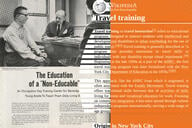You have /5 articles left.
Sign up for a free account or log in.
At least 9 (some say up to 13) of the 16 trustees of Antioch University Los Angeles have resigned in the last week, accusing the university's central administration and board of undermining their authority.
The dispute -- which trustees said was building up over time -- came to a head when the university system's board changed the bylaws that govern the authority of campus trustees. Antioch University has a central governing board, five campuses around the country and some multicampus programs. The original Antioch College is now independent, after the university board shuttered the Yellow Springs campus, setting off an ultimately successful battle by alumni to break free of a board that they viewed as focused on the newer campuses around the country.
When the university restructured, officials said that local boards would have considerable autonomy, while the central board would govern the system as a whole. The Los Angeles campus -- like the other Antioch outposts -- prides itself on the social justice mission for which the original Antioch was known, and offers undergraduate programs in liberal studies, and master's programs in such fields as creative writing, psychology and urban sustainability.
Many of the trustees who quit don't see the university living up to its ideals. "We tried to exercise our rights, so they took away our rights," said Dianna Wong, who resigned as board chair and who leads an architecture and design firm in Los Angeles.
Toni Murdock, the chancellor of the university system, characterized the bylaw changes as a clarification so that they would be consistent with those of the university system. "There's no change," she said. "There was just a little bit of ambiguity" in the bylaws, she said.
Prior to the change, the bylaws for campus boards said that trustees would "conduct when necessary a presidential search, which shall include the chancellor's participation." Now, the bylaws have been revised to say that the trustees shall "participate with the chancellor when necessary in a presidential search process, which shall inform the chancellor's hiring decision...." (In both cases, a final decision would go to the university system's board for approval.)
Other powers were also limited. The old bylaws said that the campus board would "determine" campus financial aid policies. Now the board can only recommend such policies to the chancellor.
Richard A. Hesel, another trustee who quit and a principal at Art & Science Group, a higher education consulting firm, said that the central administration "pushed back" on everything that the Los Angeles board tried to do to advance the institution. Told that Murdock had characterized the bylaws changes as clarifications, he said "bullshit," adding that as soon as he read them, "it was clear to me that they were trying to strip us of any authority or power."
Wong said that the system and Murdock appeared to become concerned over the campus boards when Neal King left the presidency of the Los Angeles campus. The Los Angeles board, Wong said, looked at the bylaws and started a search. She said that Murdock objected and wanted the board to instead appoint Tex Boggs. Eventually, Wong said, the board decided Boggs (the interim leader) was a good choice. But Wong said that Murdock was displeased that the Los Angeles board expected to lead a search.
Further, Wong said that the university system is undermining the Los Angeles campus. She said payments by the campus to the central administration are increasing, largely for technology and other administrative functions that she doesn't see helping anyone in Los Angeles. "The system is serving the system, not the campuses or the students," she said.
Some of the system's critics believe that King left the Los Angeles presidency in April in part because of concerns over a centralization of power. King is now president of the Institute of Transpersonal Psychology. In an interview, he said that he is happy there, and moved because he was attracted to the institution. But he said that "part of the attraction is having a single board. I'm not caught between the university board, the chancellor's office and not knowing where the lines of authority are."
King said that he had doubts from the start about how Antioch's campuses could have both local boards and a national board. "You are creating these [local boards] and they are going to want a voice, and that turned out to be the case," he said. While Antioch promised to respect local choices, he said, "this is no loose federation. It's becoming a much more centralized and corporate model."
Boggs, who is the new president in Los Angeles, said that he saw the changes as the central administration and board "trying to ensure that all campuses participate as a single campus, and no one campus works in isolation from the other campuses."
Murdock insisted that she expected to work well with local boards, and did not see the bylaw changes as significant changes in the power structure. As for the allegations that the central administration is charging too much money, or taking over too many decisions, she said that "I would imagine that is not the first time you have heard that from a multicampus system."




